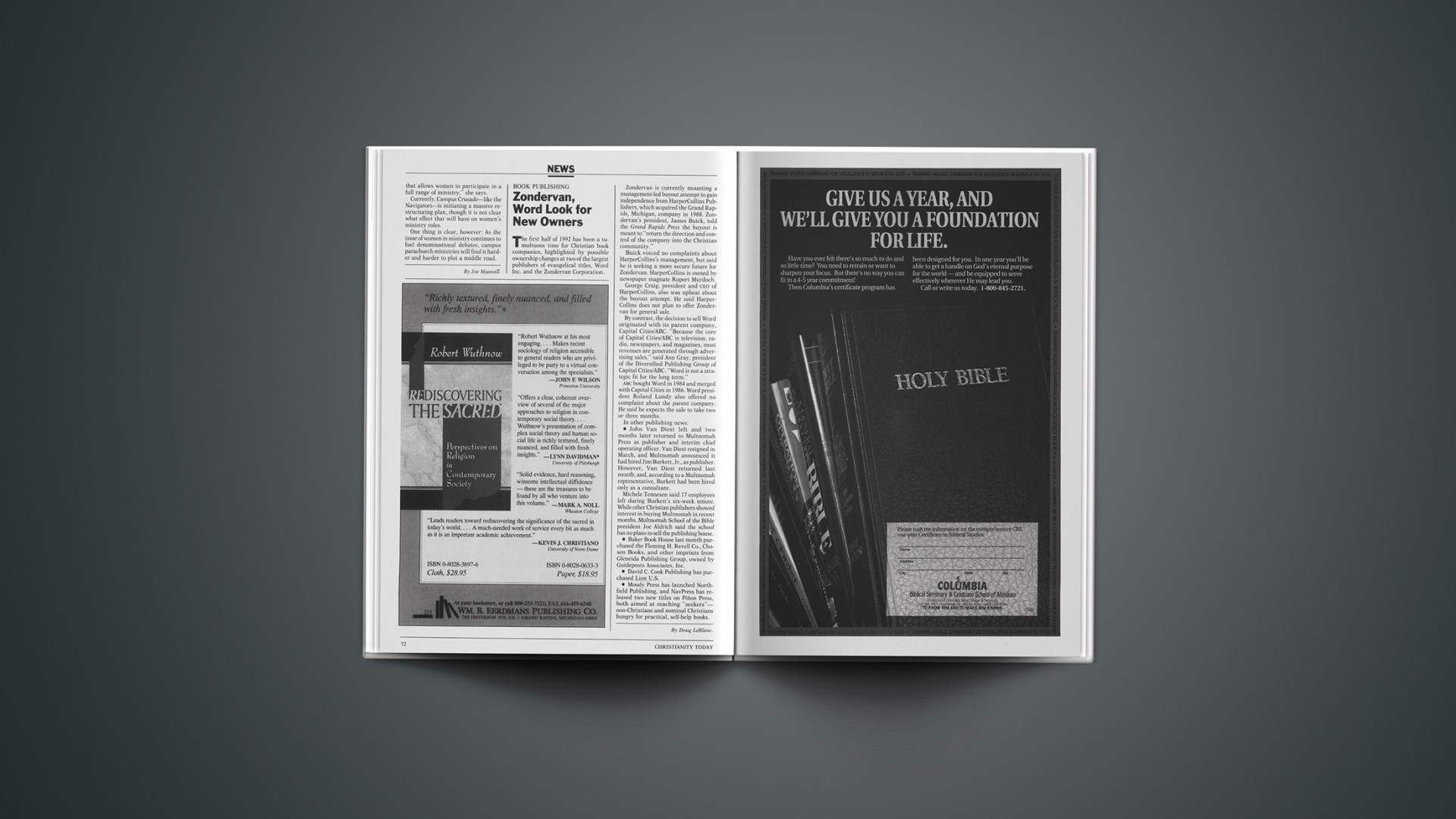Since Columbus, Roman Catholicism has dominated the history and culture of Latin America. Protestantism was virtually unknown in the region until last century, and then only in a marginal way.
But beginning in the 1940s, Protestantism began mushrooming in Latin America. In 1938 Protestants totaled about 600,000. A decade later they had multiplied five times to 3 million. Another explosion has occurred in the last twenty years—from 15 million to more than 40 million.
To understand the historical causes of this extraordinary transformation, Christian History sat with Samuel Escobar, Thornley B. Wood Professor of Missiology at Eastern Baptist Theological Seminary in Philadelphia, Pennsylvania.
Christian History: What did religious life in a typical Latin American town look like 400 years ago?
Escobar: In the 1600s, the life of the town would be determined by the church. The Spanish planted their churches in the main square, right beside the government building. The church’s presence was felt nearly everywhere.
For instance, people kept time by the church bells. When the bells rang in early morning, you knew it was just before six—time for morning mass. When they rang at late afternoon, it was about four—time for prayer.
The calendar was also governed by the church. In addition to Easter week and Christmas, elaborate festivities were held in each country (and many cities) to honor its patron saint. In Peru, it was Santa Rosa on August 30, and in Mexico, the Virgin of Guadalupe on December 6.
The intellectual life was also thoroughly controlled by the church. Every book read and every teaching offered would be checked. The Catholic church controlled nearly every sphere of life.
Where were the Protestants in Latin America at this time?
The church’s control was so strong, hardly any Protestants could survive. Even as late as the nineteenth century, we find stories like this: An American visits a small town in Argentina during a religious procession. Everybody kneels, of course, except this American. As a result, he is publicly beaten and jailed and left there for months—just because he didn’t kneel.
Reformer John Calvin sent two Protestant missionaries to Brazil in 1556, but that experiment failed almost immediately. The Dutch occupied northeast Brazil for about thirty years. There were also experimental Lutheran colonies in Venezuela. But these are isolated cases.
How does religious life in a modern Latin American city compare?
Society has become increasingly secularized. When countries celebrate their independence from Spain, for instance, they also see it as a break from rigid Catholic control. In some countries, secularization has gone to an extreme. In Uruguay, Christmas is called “Family Week,” and Holy Week is called “Tourism Week.”
Another example: family-planning legislation has passed recently in Peru and Mexico. In each country, the Catholic church tried to dissuade government officials from pursuing such legislation. When that attempt failed, the church began a media campaign against contraception. It showed clearly the church’s voice no longer determines government policy.
Add to that the large percentage of Catholics who practice birth control, and you realize that Catholicism cannot exert its former hold over its members, let alone social institutions.
Then today there’s more freedom to be non-Catholic?
That’s another new reality: religious competition. In the 1600s Roman Catholicism had a monopoly. Today, most countries honor religious freedom. It’s a religious open market.
You see this especially in mass media. Protestantism pioneered the use of the media for religious purposes, especially in radio with the opening of radio station HCJB in Ecuador in the 1930s. The Catholic church reacted, and particularly in Brazil developed a strong radio network. But such open competition was unthinkable 400 years ago.
In Latin America, there’s still an overwhelming social pressure to stay Catholic, but the church has lost the means of exerting political pressure to enforce conformity.
When did Protestantism first enter Latin America in a significant way?
Not until the early 1800s, when the Latin American nations broke free of Spain and the Spanish church. That’s when pioneers like James Thomson began their work.
Sponsored by the British and Foreign Bible Society, Thomson came from England to Buenos Aires in 1816 and worked until 1827. He went from Argentina to Uruguay to Chile to Peru to Mexico, just as these independence movements were beginning.
He wasn’t as interested in establishing Protestant churches as in promoting Bible reading within the Catholic church. In every city he found a group of priests who were interested in promoting Scripture reading, and he even created a Bible society in Colombia.
At the end of the century, we have the famous Francisco Penzotti, an illiterate Italian who came to Uruguay, where he was converted. He started to read and study, became a colporteur, peddling devotional material, and traveled all over Latin America in the 1880s, taking Bibles with him. He went town by town on horse, from Argentina to Bolivia, then on to Peru. In many places, Penzotti was either the founder or among the founders of the town’s First Methodist Church.
Once he was jailed in Peru because of his Protestantism. Some American traveler took his picture there, and it was published in a New York newspaper. Because of Penzotti’s Italian heritage and his connection with the American Bible Society, the incident became an international scandal. It brought to people’s attention the religious intolerance of Latin America, and it opened the door for greater religious freedom there.
How have Protestants evangelized in Latin America?
Catholics aimed at the elites. They believed that if you reach the elites and educate them, the rest of society will follow.
Protestants set their sights on the people. James Thomson is a case in point.
Thomson was a member of the Lancasterian Society, which had arisen in an England that was becoming rapidly industrialized. There, crowds of children flocked to city schools, and there weren’t enough teachers. What do you do then? You take the best students and make them mentors to the others, multiplying the effect of the teacher. In the 1820s, the Lancasterian system was the latest word in education.
Thomson thus became an educational adviser to many of the independence leaders. He would tell them, “You’re beginning your life as an independent, democratic nation. I offer you a method to educate not the elites but the masses.”
Why did Protestantism start mushrooming in the 1940s and 1950s?
Generally speaking, change in social structures causes significant change in people’s behavior. In the case of Latin America, the significant structural change was land reform.
In Bolivia, for instance, land was redistributed in 1952. That was the year we see significant Protestant growth among the Aymaná and Quechua tribes, the native communizes in Bolivia and Peru who descended from the Incas. Why? Before people owned their land, they had to go to the local Catholic church because the landowner was Catholic; it was the only church he would allow in his territory. After land reform, no one held enough land to control the religious environment, and so choice became a reality.
About the same time, more and more people began moving to cities. In villages, the Catholic priest remains a key person. He knows where people go, what they do. A Protestant has a difficult time getting converts because of the social coercion.
In the city, no church is able to control all that goes on. So when people move to the city, they are more free to choose their own religion.
What makes Protestant Christianity appealing to today’s Latin Americans?
They see a Christianity that accepts their culture. Protestants, Pentecostals in particular, have adapted themselves better to the Latin American mentality.
Chile has the largest Pentecostal denomination in Latin America—the Methodist Pentecostal Church. It began early in this century when Willys Hoover, a Methodist, had a Pentecostal experience and began a healing ministry. The Methodist Church could not handle this, so he eventually left and formed the Methodist Pentecostal Church.
These Methodist Pentecostals were less dependent on North American church practices. They created their own hymns, preached in a Latin style, were more expressive in worship. This church mushroomed. The Methodist Church they left has only 8,000 members today. The offshoot denomination has 800,000.
Second, Protestantism helps people organize their lives. Marginalized people tend to have difficulty holding down jobs, controlling drinking, keeping families intact. Pentecostals have gone to the poorest sections of cities and brought these people a Bible centered Christianity. They’ve gotten people to stop drinking, and taught them to read and to take family responsibilities seriously. Consequently, Protestantism has created upward mobility. As people become more self-disciplined and responsible, they start to become leaders in their businesses and communities.
In addition, such churches become places where people who are nobodies can become somebodies. People whose voice does not matter in society can prophesy in the church.
At the same time, networks are created. In a thousand-member church—not an uncommon phenomenon in Latin America today—people have a great many contacts. A businessman will naturally draw many of these people as customers. Or if you lose a job, it’s likely someone in that church can give you a new one.
In addition, Protestantism is tremendously flexible. In Catholicism you need a priest to administer Communion, the most important element of Catholic piety. Protestants need only a Bible and perhaps a hymnbook. And anyone can preach or lead singing.
If we add to that the spiritual gifts the Pentecostals stress, like healing, you have a powerful catalyst for people to become Protestants.
What are the weaknesses in contemporary Latin American Protestantism?
Perhaps the most troubling is the tendency to be dualist. Especially in Pentecostalism, the world is seen primarily as a fight between light and darkness, between the church and the world. Soon governments become the work of the Devil or the visitation of God.
A Baptist sociologist studied the sermons of Pentecostal pastors in Chile. He noted that when military dictator Augusto Pinochet overthrew Marxist Salvador Allende, the preachers said that the Angel of Jehovah had come to expel the Devil from the nation. Thus Pentecostals can sometimes be manipulated for political ends.
Protestant growth in Latin America today is phenomenal. Is it a new Reformation?
To some extent. Just as in the 1500s in northern Europe, a spiritual and theological revival is having great social and political consequences within a Catholic environment.
There’s a better historic analogy, though: the revivals under John Wesley in the 1700s. Those Wesleyan revivals took place during a period of rapid industrialization and urbanization in England. Industry and urban areas are growing rapidly in this century in Latin America, and once again, Protestantism is helping people make adjustments.
That comparison, in fact, gives me hope for Latin America. The Wesleyan revivals enabled positive social change without the poor having to resort to violence. Given the power of Protestantism to improve the lives of people, I see the possibility of peaceful social change occurring in Latin America as well.
Copyright © 1992 by the author or Christianity Today/Christian History magazine. Click here for reprint information on Christian History.









